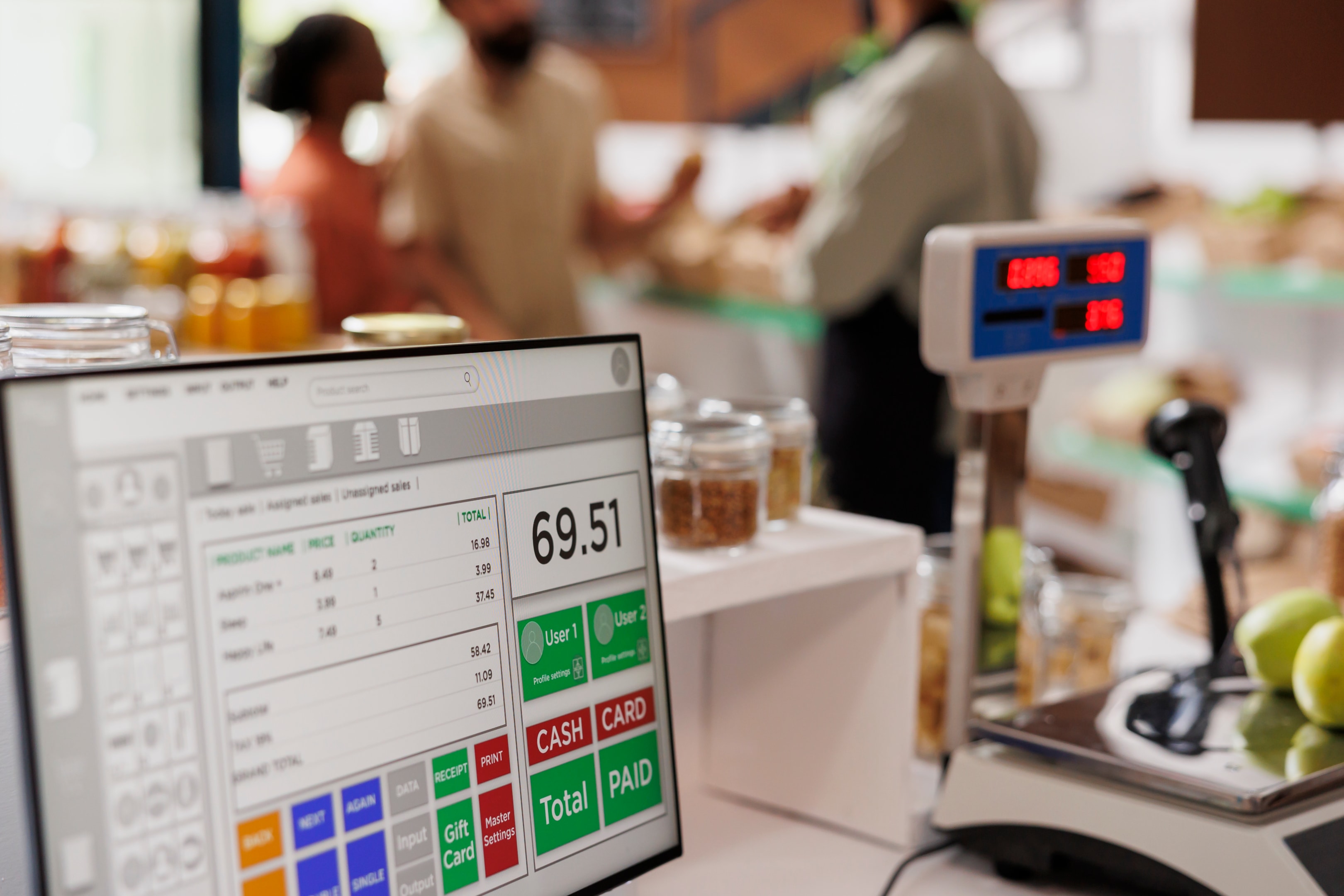The retail landscape has undergone a dramatic shift in recent years. The rise of e-commerce giants has forced brick-and-mortar stores to adapt and innovate. The point of sale (POS) system is crucial to this adaptation. These POS systems have transformed from simple cash registers into sophisticated retail POS systems that manage everything from inventory management to payment processing and sales management.
Choosing the right POS software can be daunting for retailers. With numerous cloud-based POS systems, each retail store must consider its unique needs and budget. This blog dives into the top POS systems companies in 2024, highlighting their distinctive features and advantages.

Shopify has long been a frontrunner in the POS software industry. It is known for its seamless integration between online and offline sales channels. It offers a comprehensive retail POS system that caters to small businesses and large enterprises.
Key Features:
- Cloud-Based POS Systems: Shopify’s POS system is entirely cloud-based, ensuring all data is synchronized in real-time across multiple locations. This feature mainly benefits businesses with multiple locations, enabling centralized inventory and sales data control.
- Inventory Management: Shopify excels in inventory management, offering advanced tools to track stock levels, manage orders, and predict future inventory needs based on sales data.
- Payment Processing: The platform supports various payment solutions, including credit card processing, online payments, and integration with multiple gateways. The built-in card reader simplifies payment processing for retail stores.
- Sales Reporting and Analytics: Shopify provides robust sales reporting capabilities, offering insights into sales trends, customer behavior, and product performance. These analytics tools help businesses make informed decisions to optimize their operations.
- Customer Relationship Management: Shopify’s POS system includes powerful customer relationship management features, allowing businesses to track customer data and purchase history and manage loyalty programs.
- E-commerce Platform Integration: Shopify’s POS solutions are tightly integrated with its e-commerce platform, enabling businesses to manage their online and offline sales from a single dashboard. This integration is vital for companies looking to streamline their operations and enhance customer experiences.
- Mobile POS System: The mobile POS capabilities allow businesses to process transactions anywhere within the store, enhancing the customer experience and reducing wait times.
- Third-Party Apps: Shopify supports integration with various third-party apps, allowing businesses to add functionalities as needed.
Square
Square has revolutionized how small and medium-sized businesses handle transactions with its user-friendly and affordable POS systems. Known for its flexibility and ease of use, Square is a top choice for many companies.
Key Features:
- Cloud Technology: Square’s cloud-based POS systems ensure all transaction data is stored securely and can be accessed from anywhere. This feature is essential for businesses that require mobility and flexibility.
- Sales Reporting and Analytics: Square provides comprehensive sales reporting tools that offer insights into sales trends, employee performance, and customer preferences. These tools are crucial for businesses looking to improve their operational efficiency.
- Payment Processing: Square offers various payment processing options, including credit card payments, online purchases, and mobile payments. The built-in card reader simplifies the checkout process.
- Inventory Management: Square’s inventory management features help businesses keep track of stock levels, set alerts for low inventory, and generate purchase orders automatically.
- Customer Relationship Management: Square includes features for managing customer data, creating customer profiles, and tracking purchase history. This data is valuable for businesses that build strong customer relationships and enhance loyalty programs.
Revel Systems
Revel Systems is a leading provider of POS solutions known for its powerful and flexible platforms. It caters to businesses of all sizes and offers many features to streamline operations and enhance customer experiences.
Key Features:
- Cloud Technology: Revel’s cloud-based POS systems ensure that all data is stored securely and can be accessed in real-time from any location. This feature is particularly beneficial for businesses with multiple locations.
- Inventory Management: Revel offers advanced inventory management features, allowing businesses to track stock levels, manage orders, and forecast future inventory needs.
- Sales Reporting and Analytics: Revel provides detailed sales reporting tools, offering insights into sales trends, customer behavior, and employee performance. These analytics tools help businesses make data-driven decisions to optimize their operations.
- Customer Relationship Management: Revel’s customer relationship management features allow businesses to track customer data, manage loyalty programs, and create targeted marketing campaigns.
- Payment Processing: Revel supports different payment solutions, including credit card processing, mobile payments, and integration with various payment gateways.

Factors to Consider When Choosing the Right Retail POS System
When selecting a point-of-sale system, businesses should consider their specific needs and the unique features offered by each provider. Key factors to consider include:
1. Business Needs
The specific needs of your business and your industry are fundamental considerations. Retail stores, restaurants, and service-based businesses have different requirements. For instance, a retail POS system needs robust inventory management features, while a POS system for the restaurant industry should have efficient table management and online ordering capabilities.
2. Scalability
As your business grows, your POS system should be able to scale with you. Look for POS solutions that can handle multiple locations and increase transaction volumes without compromising performance. Scalability also involves adding new features or integrating with other business tools as needed.
3. Integration Capabilities
A robust POS system should seamlessly integrate with your existing software and platforms, including e-commerce platforms, accounting software, and third-party apps. These integrations streamline operations and provide a unified view of your business, enhancing overall efficiency and decision-making processes.
4. Ease of Use
The ease of use of the POS software is critical for ensuring that your staff can quickly learn and efficiently operate the system. A user-friendly interface minimizes training time and reduces the likelihood of errors during transactions.
5. Cost
Consider the software costs, including the monthly fee and additional costs for hardware, integrations, or advanced features. Some POS providers offer flexible pricing plans that cater to businesses of different sizes and budgets. It’s also essential to assess whether the system can work with your existing hardware, such as receipt printers, cash drawers, and barcode scanners.
6. Customer Support
Reliable customer support is vital for addressing any issues with your POS system. Look for providers that offer comprehensive support services, including phone, email, and live chat support, as well as detailed documentation and tutorials.
7. Security
Security is a crucial aspect of any POS system. Ensure the provider offers robust security features, such as encryption, secure payment gateways, and compliance with industry standards like the Payment Card Industry Data Security Standard (PCI DSS).
8. Flexibility and Customization
Every business has unique requirements, and a one-size-fits-all approach may not work. Look for POS systems that offer customization options to tailor the system to your needs. This could include custom reports, loyalty programs, and personalized customer experiences.
9. Reporting and Analytics
Detailed sales reporting and analytics are essential for understanding your business performance and making data-driven decisions. Look for POS systems that provide comprehensive reporting tools, allowing you to track key metrics such as sales data, inventory levels, and customer behavior.

Key Benefits of Using Advanced POS Systems
The evolution of point-of-sale systems has brought numerous advantages to businesses across various industries. Advanced POS solutions offer a range of features that can significantly enhance operational efficiency and improve customer experiences. Here are some key benefits of using advanced POS systems:
Enhanced Inventory Management
Advanced POS systems come equipped with robust inventory management features. These tools allow businesses to track stock levels in real time, set automatic reorder alerts, and manage inventory across multiple locations. By having a clear view of inventory, businesses can reduce stockouts and overstock situations, leading to better cash flow management and improved customer satisfaction.
Improved Sales Reporting and Analytics
One of the standout features of modern POS systems is their ability to generate detailed sales reports and analytics. These insights help businesses understand sales trends, identify best-selling products, and make decisions on inventory and marketing. With real-time access to sales data, companies can quickly adapt to changing market conditions and optimize their operations for maximum profitability.
Streamlined Payment Processing
Advanced POS solutions support various payment methods, including credit card, mobile, and online payments. Integrated payment gateways ensure that transactions are processed quickly and securely, reducing customer wait times and minimizing the risk of payment fraud. Additionally, businesses can benefit from features like split payments, tipping, and loyalty program integration.
Better Customer Relationship Management
Effective customer relationship management (CRM) builds customer loyalty and drives repeat business. Modern POS systems offer integrated CRM tools that allow companies to collect and analyze customer data, track purchase histories, and launch targeted marketing campaigns. By understanding customer preferences and behavior, businesses can personalize their offerings and create more engaging customer experiences.
Increased Operational Efficiency
Automation is a crucial advantage of advanced POS systems. Features like automated inventory updates, employee management, and real-time data synchronization across multiple locations help streamline operations and reduce manual work. This increased efficiency allows staff to focus on delivering excellent customer service, ultimately enhancing the overall customer experience.
Scalability and Flexibility
As businesses grow, their POS systems need to scale accordingly. Advanced POS solutions are designed to accommodate growth, supporting additional registers, new locations, and increased transaction volumes. This scalability ensures businesses can continue to operate smoothly as they expand. Moreover, features like cloud technology and mobile POS systems provide the flexibility to adapt to changing business needs and environments.
Find the Perfect POS Systems for Your Business Needs
Choosing the right point-of-sale system is crucial for any business aiming to improve efficiency, enhance customer experiences, and drive growth. The POS systems from Shopify, Square, Revel Systems, Lightspeed, and Toast offer a range of features tailored to different industries and business needs. Whether running a retail store, managing a chain of restaurants, or overseeing a large enterprise, these POS platforms provide the tools and capabilities necessary to succeed in today’s competitive market.
Investing in a modern POS solution helps streamline sales management, inventory management, and payment processing and offers advanced tools for customer relationship management, sales reporting, and employee management. By leveraging the power of cloud-based POS software, businesses can ensure operational efficiency, data security, and scalability, positioning themselves for sustained success in 2024 and beyond. For enterprises transitioning from traditional POS systems, these modern solutions represent a significant upgrade in functionality and flexibility.

